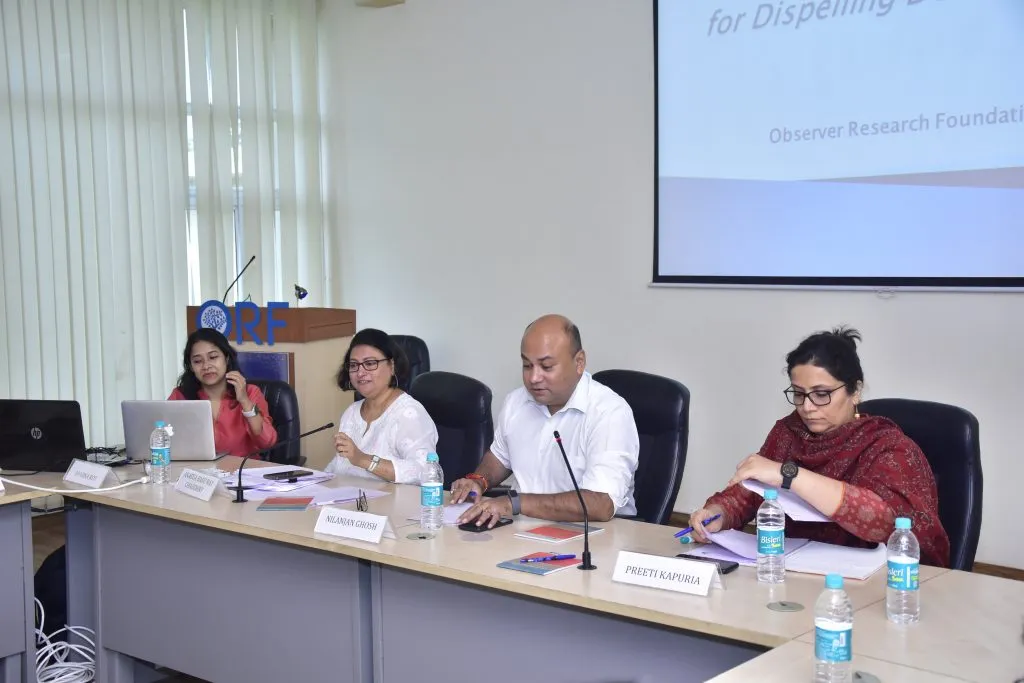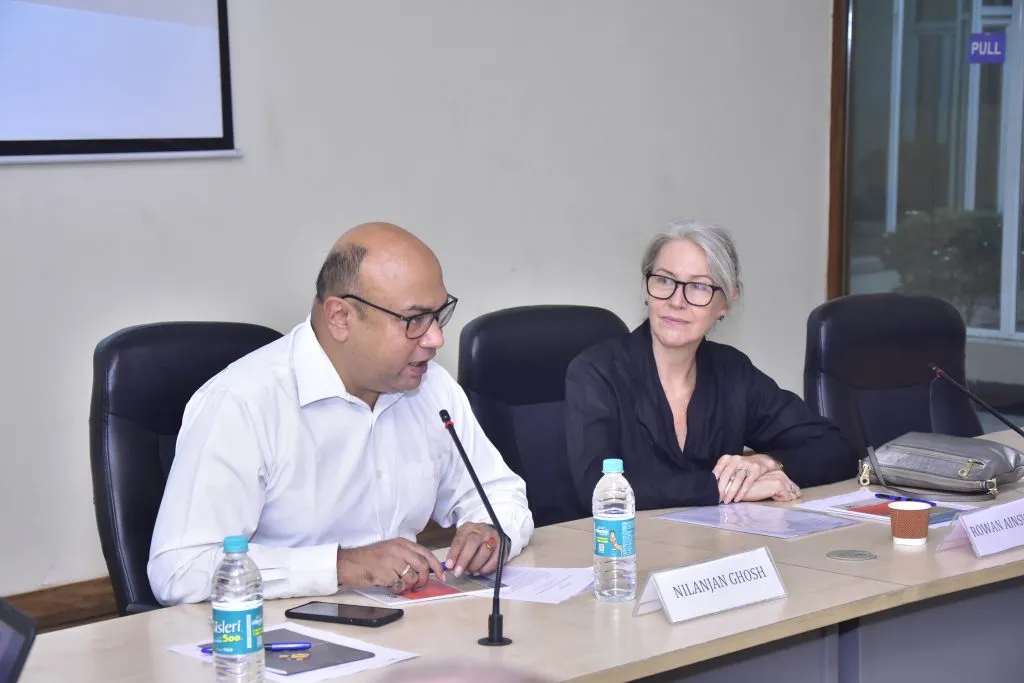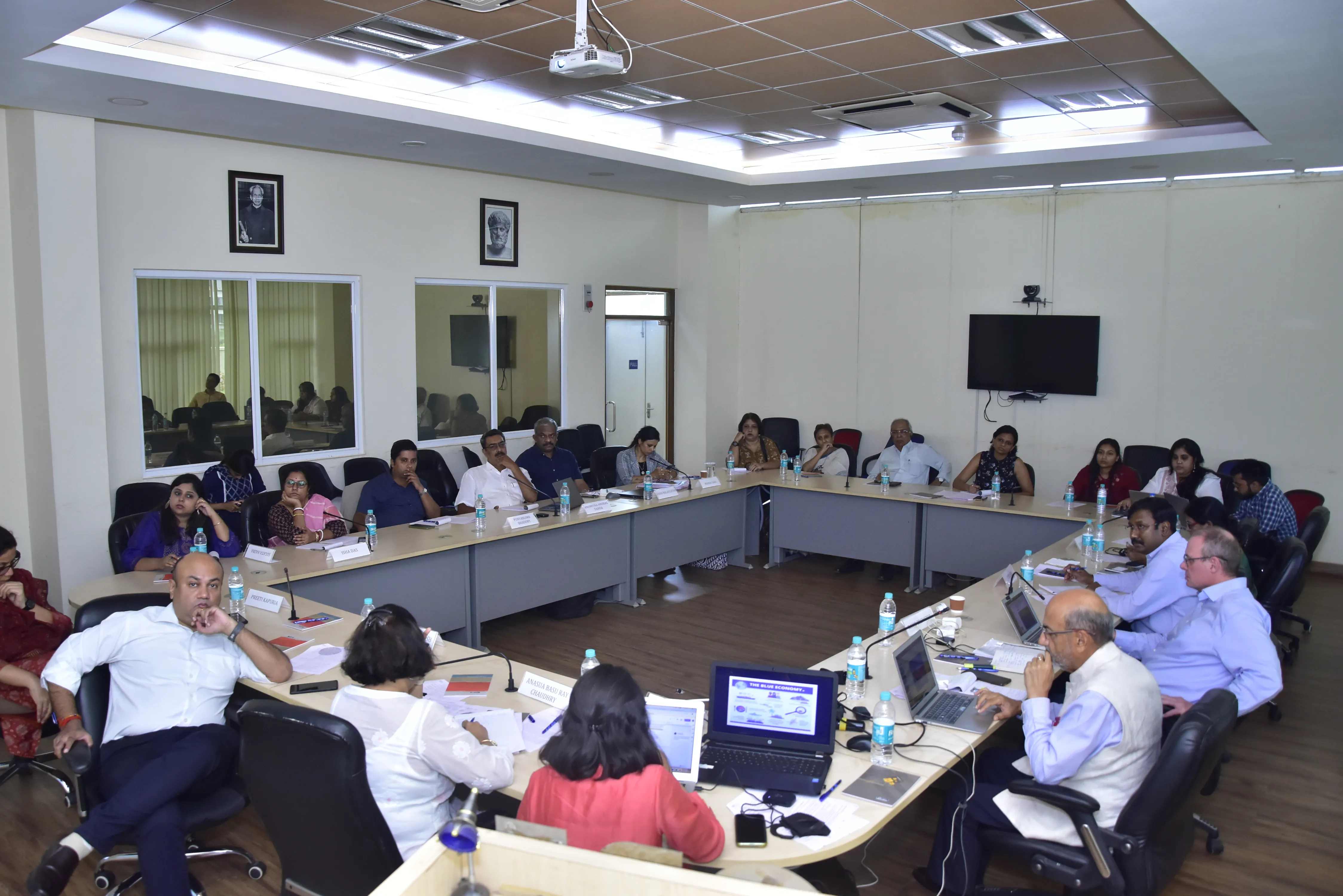Over the years, oceans and marine ecosystems have been critical players in driving economic growth and development for countries across the globe. With a multitude of resources serving out various livelihood options, “Blue Economy” has been a great frontier of exploration and exploitation while at the same time demanding conservation and regeneration. One such critical marine space is the Bay of Bengal (BoB) region, extending into the wider Indo-Pacific. The implications of sustainable use of the blue economy, for advancing various developmental goals, loom large in this region. Therefore, there is an urgent need to identify focus areas located at the intersection of science and policy to enable effective governance of the Bay of Bengal Large Marine Ecosystem (BOBLME) for sustainable development.
Against this backdrop, the Observer Research Foundation (ORF) conducted a day-long inception workshop, “Blue Economy: Myriad Hues for Dispelling Development Blues” on 29 July 2022, with an array of experts from diverse backgrounds to discuss the research gaps within this domain and chalk out the broad research questions in public policy. The primary objective of the workshop was to chart out an agenda for research and critical thinking over the blue economy for ORF, over the next 3 years. After the welcome remarks were made by Dr Nilanjan Ghosh, Director ORF Kolkata and Center for New Economic Diplomacy, Ms Rowan Ainsworth, Consul General, Consulate General of Australia in Kolkata, in her inaugural address, highlighted the importance of identifying key areas of intervention that can lay a roadmap for sustainable blue economy-driven growth in the BoB region, as well as the larger Indo-Pacific. The remainder of the workshop was divided into two business sessions.

The first was on ‘Marine and Coastal Ecosystems’ with Dr Anamitra Anurag Danda, Director of the Sundarbans Programme, WWF India and Senior Visiting Fellow, ORF Kolkata, as the moderator. It dwelt on the marine and coastal ecosystems in the region, their implications on livelihoods and security of the people, and various stressors that continue to confront the evolving economic, environmental and geopolitical dynamics of marine ecosystems in the region. Prof Sugata Hazra, former Director, School of Oceanographic Studies, Jadavpur University, Kolkata, pointed out that mangrove ecosystems in Indian Sunderbans and Australia are both vulnerable to threats of climate change and sea level rise, and these commonalities should lead to synergies for environmental conservation efforts across these nations. Isha Das, Research Associate, School of Oceanographic Studies, Jadavpur University, Kolkata, emphasized that anthropogenic intervention in marine and coastal ecosystems have had detrimental impacts on aquaculture and fisheries management, leading to revenue loss.
Vinod Malayilethu, Team Leader, Marine Conservation Programmes, WWF India, argued that India, as a key player in the region needs to be more proactive on governance related to its seafood sector. Tools such as eco-labelling can make its exports more competitive in global seafood trade. Sustainable marine management is faced with several threats, of which, Mahua Saha, Principal Scientist, Chemical Oceanography, National Institute of Oceanography, Goa, identified microplastics as one of the major threats posing pathological, chemical and biological risks to the marine ecosystems. She stressed that efforts must be directed towards identification, quantification and impact assessment of microplastics across tropic levels to ensure sustainability of the blue economy. Another aspect of sustainable use of the blue economy was highlighted by Prof Punyasloke Bhadury, Department of Biological Sciences, IISER Kolkata, and Saudamini Das, Fellow, Institute of Economic Growth, Delhi, relating to the economic valuation of its services. Economic evaluation of ecosystem services from the blue economy is vexed with critical issues such as over-exploitation, property rights and distributional impacts, and most visibly its role as a global common. Keeping in mind the interconnectedness of ecosystem services across countries, transboundary initiatives of research and actionable strategies to enable data sharing for advancements along SDG 14, was deemed necessary.

The second session, moderated by Dr Ghosh, focused on ‘Interface of SDG 14’ with other sustainable development goals. SDG 14 targets sustainable use of life under water, harnessing the true potential of the blue economy for growth and development to advance peace and prosperity of the planet. As such, efforts should be made to understand its inter-linkages within the overall SDG framework to convert potential synergies into reality for ensuring sustainable development. According to Aparna Roy, Fellow and Lead, Climate Change and Energy, Centre for New Economic Diplomacy, ORF, simultaneous progress towards addressing climate change and sustainable blue economy development in the BoB region, can offer two-fold benefits; enhancing resilience of the ocean’s resources and mitigating climate change. Preeti Kapuria, Fellow, ORF Kolkata, highlighted the viability of sustainable polycentric governance of natural resources, moving beyond states and markets, which look into elements of a transition to ocean governance. She further noted that ocean governance is merely a subset of environmental governance. Subsequently, Dr Danda, pointed out that the concept of SDG and its interrelatedness do not represent the substitution of the various goals and targets for each other and that there remains an inherent hierarchy within the sustainability parameters.
Prof Sanjay Chaturvedi, Chairperson, Department of International Relations, South Asian University, New Delhi, commented on the need to move beyond the land-sea boundaries to locate blue economy in the BoB region, identify vertical and horizontal intersections, mismatches between ecological and territorial interests, and the conflicts of material-discursive and temporal-spatial regimes. Furthermore, Dr Anasua Basu Ray Chaudhury, Senior Fellow, ORF, Kolkata, emphasised on the information sharing and its various challenges in the context of regional governance for the blue economy. Cross-border cooperation with neighbouring states will be crucial for effective joint decision-making structures. Dr David Brewster, Senior Research Fellow, National Security College, Crawford School of Public Policy, Australian National University, in his concluding remarks explained how different countries look at the blue economy in light of their own priorities, therefore, a common framework for ocean governance is fundamental for effective engagement. Brining the session to a close, Subir Sen, Associate Professor at Indian Institute of Technology, Roorkee, summarized the key points of deliberation.
While highlighting the critical challenges confronting sustainable development of the blue economy in the BoB region, the workshop was instrumental in bringing forth key ideas such as leveraging technology to understand issues of oceanic sustainability, adopting a landscape approach to studying ecosystems complementarities, partaking in transboundary initiatives in the form of research and development or actionable strategies to create opportunities for data sharing, and most importantly, formulating a range of interventions to improve governance, finance, science and management of a Sustainable Ocean Economy (SOE). Exploring these ideas can substantially contribute to the larger body of work on the blue economy.
This report has been compiled by Debosmita Sarkar and Sohini Bose, Junior Fellows, ORF Kolkata with help from Soumya Bhowmick, Associate Fellow, Sreeparna Banerjee and Ambar Kumar Ghosh, Junior Fellows, ORF Kolkata.
The views expressed above belong to the author(s). ORF research and analyses now available on Telegram! Click here to access our curated content — blogs, longforms and interviews.






 PREV
PREV

